Sneezing in kittens is a common concern for many pet owners, signaling potential health issues that require attention. Understanding the root cause behind your kitten's sneezing can be pivotal in safeguarding its well-being.
From viral infections to environmental triggers, various factors could be at play. By unraveling the mystery of your kitten's sneezes, you can not only address the current symptoms but also take proactive steps to ensure a healthier future for your beloved feline companion.
Key Takeaways
- Sneezing in kittens can be due to infections, allergies, or irritants.
- Vaccinations may cause temporary sneezing, monitor for side effects.
- Treat sneezing kittens with appropriate medications and keep the environment clean.
- Regular vet check-ups and vaccinations are essential for kitten health.
Sneezing in Kittens Overview
Sneezing in kittens is a common symptom that can indicate various underlying health issues, ranging from viral infections to environmental irritants. It is essential for kitten owners to monitor this symptom closely, as it can be a sign of more serious conditions such as upper respiratory infections, rhinitis, sinusitis, asthma, allergies, or reactions to vaccinations.
Sneezing, accompanied by nasal discharge, runny eyes, poor appetite, and lethargy, may suggest a more severe health issue requiring prompt veterinary attention. To address sneezing in kittens, treatments may include antibiotics for bacterial infections, antivirals or Lysine for viral infections, and environmental adjustments to minimize irritants.
Regular vet check-ups and a clean, stress-free environment are crucial for maintaining a kitten's health and well-being.
Causes of Sneezing in Kittens
Various underlying factors can contribute to the occurrence of sneezing in kittens, necessitating a thorough investigation to pinpoint the specific cause. Some common causes of sneezing in kittens include rhinitis or sinusitis, foreign bodies, prolonged inflammation, asthma, allergies, and even vaccinations. Here is a breakdown of these causes:
| Causes of Sneezing in Kittens | Description |
|---|---|
| Rhinitis or sinusitis | May require swab testing. |
| Foreign body | May need advanced imaging for diagnosis. |
| Prolonged inflammation | Can cause permanent damage. |
| Asthma and allergies | Can also lead to sneezing. |
| Vaccinations | May cause transient sneezing. |
Upper Respiratory Infections
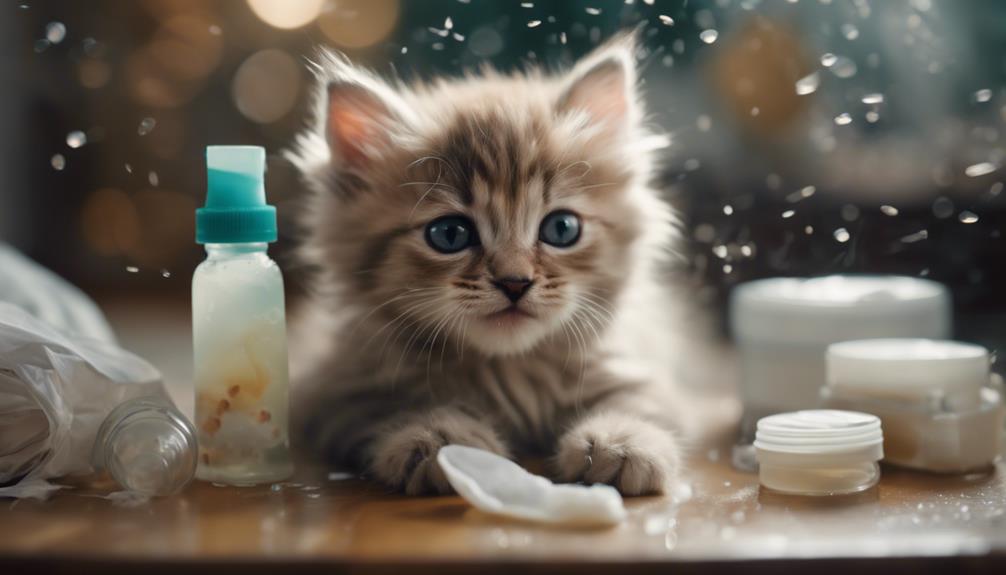
Upper respiratory infections in kittens, commonly caused by viruses, bacteria, fungi, or a combination of pathogens, present a significant health concern for young felines.
These infections are prevalent in shelter environments and multi-cat households due to close contact and stress.
Symptoms typically include sneezing, nasal discharge, runny eyes, lethargy, and decreased appetite. Prompt diagnosis and treatment are essential to prevent complications such as pneumonia or chronic respiratory issues.
Proper hygiene practices, isolation of infected kittens, and vaccination against common pathogens like feline herpesvirus and calicivirus are crucial preventive measures.
Veterinary examination, including swabs for testing, may be necessary to identify the specific pathogen causing the infection and tailor appropriate treatment strategies for the individual kitten's needs.
Viral Rhinotracheitis and Calicivirus
Viral rhinotracheitis and calicivirus are two common respiratory infections that significantly impact the health of kittens. Feline viral rhinotracheitis, caused by the herpesvirus, is highly contagious and manifests as sneezing, nasal discharge, and fever. Calicivirus, another frequent culprit, leads to similar symptoms along with oral ulcers and joint pain.
These infections spread through direct contact with infected cats or contaminated objects. Vaccines are available to prevent both viral infections, emphasizing the importance of timely immunization. Treatment involves supportive care to alleviate symptoms, such as hydration, proper nutrition, and sometimes antiviral medications.
Prompt veterinary attention is crucial to manage these infections effectively and prevent complications like pneumonia. Owners should isolate infected kittens and practice good hygiene to curb the spread of these diseases.
Rhinitis and Sinusitis in Kittens
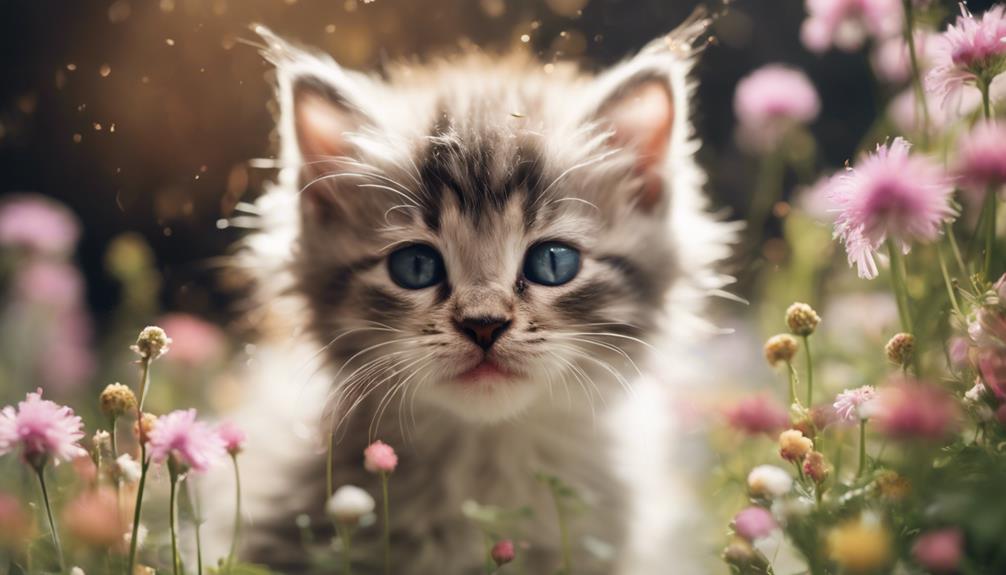
Rhinitis and sinusitis in kittens present as inflammatory conditions affecting the nasal passages and sinuses, often triggered by irritants such as cigarette smoke, cleaning products, pollen, or dust. These conditions can lead to symptoms like nasal discharge, sneezing, sniffling, and snorting, making kittens vulnerable to secondary bacterial or fungal infections. Foreign bodies like grass seeds can also cause irritation, exacerbating the problem.
| Rhinitis and Sinusitis in Kittens | Emotion |
|---|---|
| Difficulty breathing | Concern |
| Persistent sneezing | Worry |
| Nasal discharge | Empathy |
| Veterinary care needed | Urgency |
Symptoms of Rhinitis and Sinusitis
Symptoms of rhinitis and sinusitis in kittens typically manifest as nasal discharge, sneezing, sniffling, and occasional snorting, indicating potential inflammation in the nasal passages and sinuses. These symptoms can vary in severity and duration, requiring prompt attention to prevent complications. When observing these signs in your kitten, it is essential to consider the following:
- Frequency of Symptoms: Monitor how often the kitten displays these symptoms to assess the progression of the condition.
- Color and Consistency of Nasal Discharge: Note any changes in the color or consistency of the discharge, as this can provide insights into the underlying cause.
- Presence of Other Respiratory Issues: Look out for additional respiratory symptoms like coughing or wheezing, which can indicate a more complex respiratory issue.
Treatment for Sneezing Kittens
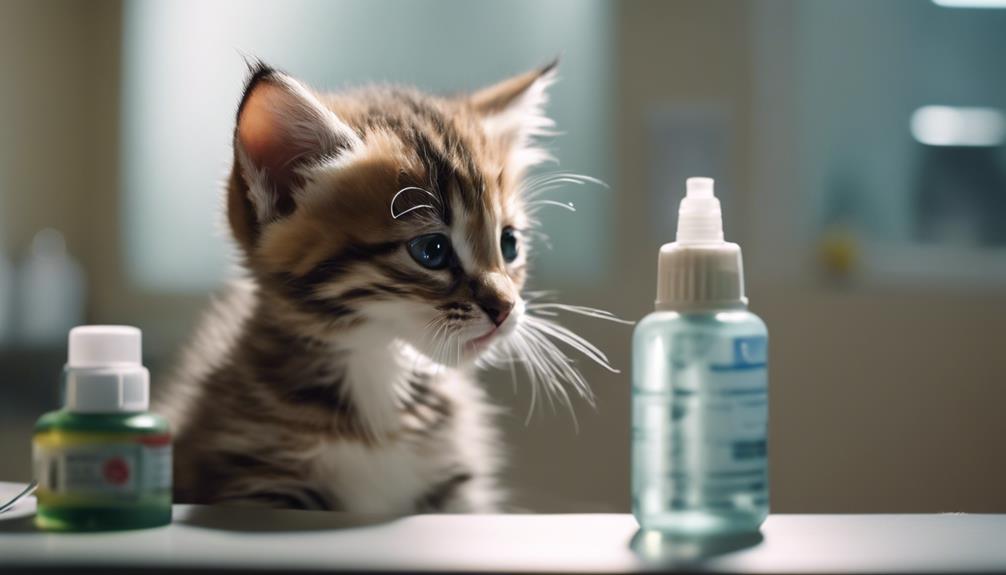
Effective treatment for sneezing kittens involves a comprehensive approach tailored to address the underlying causes of the symptoms. Antibiotics are essential for bacterial infections, while antivirals or Lysine can combat viral issues. In cases of inflammation, eye drops, nasal drops, and steroids prove beneficial.
Subcutaneous fluids help with dehydration, and maintaining a clean, irritant-free environment is crucial. Vaccination against common infections is recommended as a preventive measure. Providing warm, aromatic food can stimulate appetite, and using humidifiers can soothe nasal passages. For asthma and allergies, medications and possibly immunotherapy are effective treatments.
It is common for kittens to experience transient sneezing post-vaccination, and monitoring for any adverse effects is advised. Regular veterinary check-ups are essential for monitoring kitten health.
Prevention of Sneezing in Kittens
One crucial aspect in ensuring the health and well-being of kittens is implementing proactive measures to prevent sneezing episodes. To achieve this, consider the following:
- Regular Cleaning: Maintain a clean environment to reduce exposure to irritants like dust, pollen, and cigarette smoke.
- Proper Vaccination: Ensure kittens receive timely vaccinations to protect against common infections that can lead to sneezing.
- Healthy Diet: Provide a balanced diet with warm, aromatic food to boost the immune system and promote overall well-being.
Asthma in Kittens
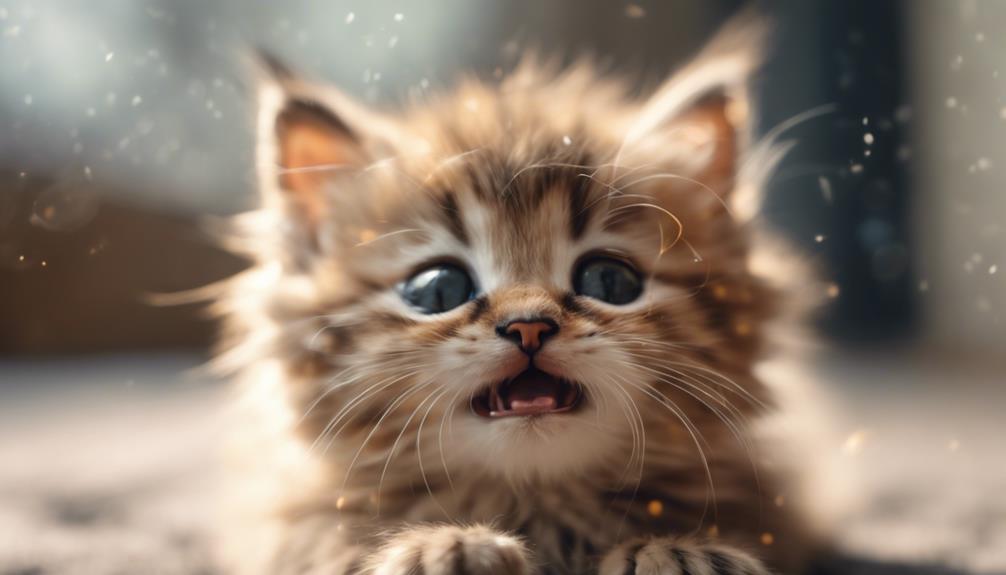
Characterized by episodes of coughing, sneezing, and difficulty breathing, asthma in kittens poses a significant health concern that requires careful management and veterinary attention. Asthma is a chronic respiratory condition that can affect kittens, leading to inflammation and constriction of the airways. Common triggers for asthma in kittens include dust, pollen, smoke, and certain fragrances. Treatment typically involves medications such as bronchodilators and corticosteroids to help alleviate symptoms and reduce inflammation. Monitoring your kitten's respiratory health and providing a clean, low-allergen environment are crucial in managing feline asthma.
| Signs of Feline Asthma | Common Triggers | Treatment Options |
|---|---|---|
| Coughing | Dust | Bronchodilators |
| Wheezing | Pollen | Corticosteroids |
| Difficulty breathing | Smoke | Allergen control |
Allergies in Kittens
A crucial aspect of maintaining optimal health in kittens involves recognizing and addressing potential allergic reactions they may experience, particularly in response to various environmental triggers. Allergies in kittens can present challenges, but with proper management, their impact can be minimized.
Here are key points to consider:
- Common Allergens: Kittens can be allergic to various substances such as pollen, dust mites, certain foods, or even certain materials used in their bedding or toys.
- Symptoms: Allergic reactions in kittens may manifest as sneezing, coughing, itching, skin rashes, or gastrointestinal disturbances.
- Management: Identifying and eliminating the allergen, providing appropriate veterinary-recommended treatments like antihistamines or hypoallergenic diets, and creating an allergen-free living environment can help alleviate symptoms and improve the kitten's quality of life.
Vaccinations and Sneezing
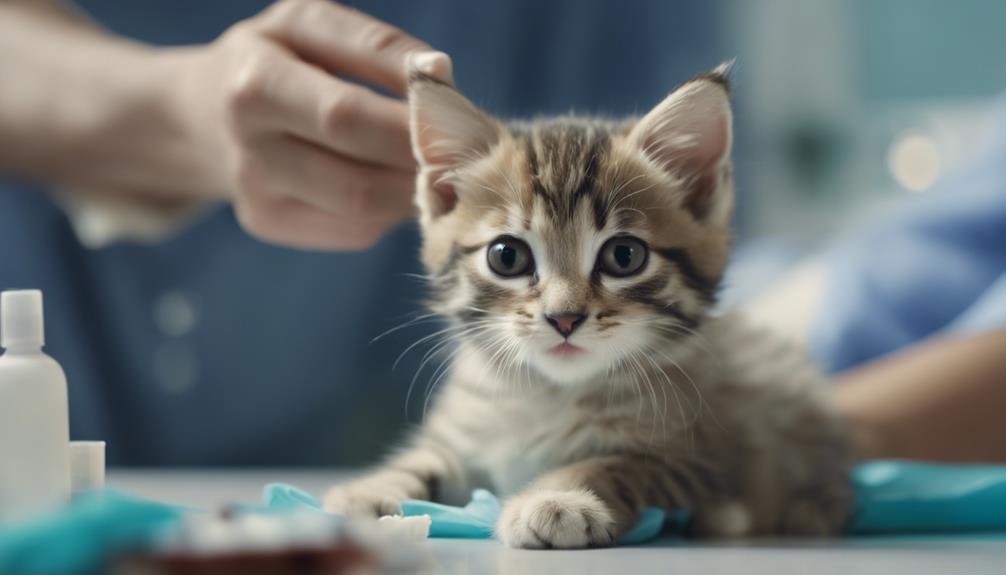
When considering the potential link between vaccinations and sneezing in kittens, it is essential to understand the role of the immune response in this process. Vaccinations work by stimulating the kitten's immune system to produce a protective response against specific diseases.
In some cases, this immune response can lead to mild, transient sneezing as the body mounts a defense against the antigens in the vaccine. It is crucial to differentiate between normal post-vaccination sneezing and persistent or severe symptoms that may indicate a more concerning issue.
Monitoring the kitten after vaccination for any unusual or prolonged sneezing, along with other symptoms, is recommended. Consultation with a veterinarian can help determine the best course of action to ensure the kitten's health and well-being.
Post-Vaccination Sneezing
After receiving vaccinations, kittens may experience transient sneezing as a normal immune response to the antigens introduced by the vaccine. This reaction typically resolves on its own within a few days as the kitten's immune system processes the vaccine components.
To understand post-vaccination sneezing better, consider the following:
- Timing: Sneezing within a few days of vaccination is commonly observed.
- Mild Symptoms: Sneezing may be accompanied by slight nasal discharge or mild lethargy.
- Monitoring: Keep an eye on your kitten's overall well-being post-vaccination, ensuring that any symptoms are temporary and do not escalate.
Monitoring Kitten Health
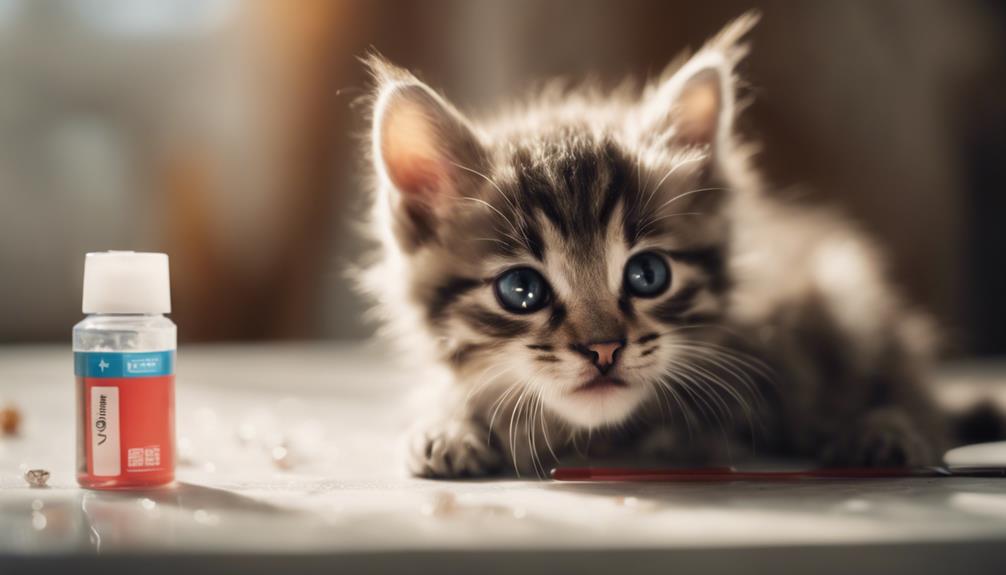
Following vaccination, monitoring your kitten's health is crucial to ensure their well-being and detect any potential adverse reactions promptly. Regular check-ups with your veterinarian are essential for tracking your kitten's growth, development, and overall health. Pay attention to any changes in behavior, appetite, water intake, litter box habits, and energy levels. Keep an eye out for symptoms such as sneezing, coughing, nasal discharge, and lethargy, which could indicate underlying health issues. Prompt veterinary intervention can help address any concerns early on, improving the chances of successful treatment and recovery. Below is a table to help you track your kitten's health effectively:
| Aspect | Monitoring Tips |
|---|---|
| Behavior | Observe playfulness and interactions. |
| Appetite | Monitor food intake and preferences. |
| Water Intake | Note the amount of water consumed. |
| Litter Habits | Track litter box usage and stool consistency. |
Frequently Asked Questions
Can Stress or Anxiety Cause Sneezing in Kittens?
Stress or anxiety can exacerbate existing conditions in kittens, potentially manifesting as increased sneezing due to weakened immunity. It's important to address the underlying causes of stress and provide a calm environment to promote overall health and wellbeing.
Is It Possible for Kittens to Develop Allergies to Certain Foods or Treats?
It is possible for kittens to develop allergies to certain foods or treats. Allergies in cats commonly manifest as skin lesions. Diagnosis may require exams, X-rays, and testing. Treatment involves medications and potentially immunotherapy for management.
How Can Environmental Changes or Moving to a New Home Affect a Kitten's Respiratory Health?
Environmental changes or moving to a new home can stress a kitten, weakening its immune system and making it more susceptible to respiratory issues like sneezing. Ensure a gradual transition, maintain a clean environment, and monitor for any signs of respiratory distress.
Are There Any Natural Remedies or Supplements That Can Help Alleviate Sneezing in Kittens?
Natural remedies like steam therapy, saline nasal drops, and honey may alleviate sneezing in kittens. Consult a veterinarian before administering any supplements. Professional guidance is crucial to ensure the safety and effectiveness of these interventions for your kitten's health.
Can Second-Hand Smoke or Exposure to Strong Scents Like Perfumes Trigger Sneezing in Kittens?
Exposure to second-hand smoke or strong scents like perfumes can trigger sneezing in kittens. These irritants can inflame nasal passages, leading to symptoms like sneezing, nasal discharge, and discomfort. Minimizing exposure to such triggers is crucial for kitten respiratory health.
Can Sneezing in Kittens Affect Their Ability to Start Walking?
It’s normal for kittens to sneeze as they develop, but it shouldn’t affect their ability to start walking. Sneezing is typically a response to irritants in the environment, and it shouldn’t hinder their kittens walking development timeline. If you notice any concerning symptoms, it’s best to consult a veterinarian for guidance.
Conclusion
In conclusion, sneezing in kittens can be caused by various factors such as upper respiratory infections, viral illnesses, allergies, and post-vaccination reactions.
It is important for pet owners to monitor their kitten's health closely, seek veterinary care if necessary, and take preventive measures to ensure their well-being.
By understanding the potential causes of sneezing in kittens and addressing them promptly, pet owners can help maintain a healthy and happy environment for their furry companions.




